Constitutional Lawyer Resume Examples

Jul 18, 2024
|
12 min read
Crafting the perfect constitutional lawyer resume: how you can draft a rock-solid document that stands tall in the court of job applications.
Rated by 348 people
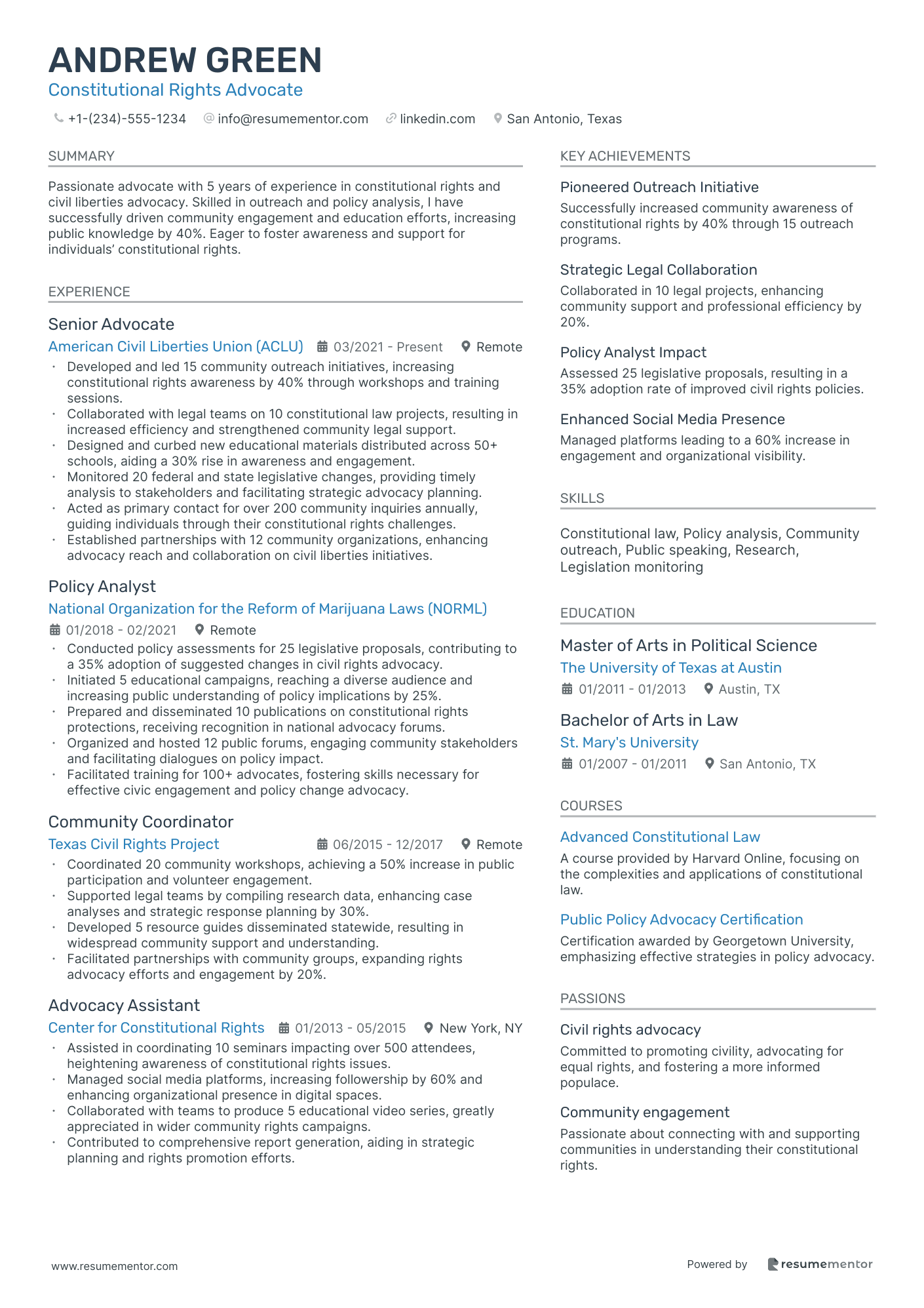
Constitutional Rights Advocate
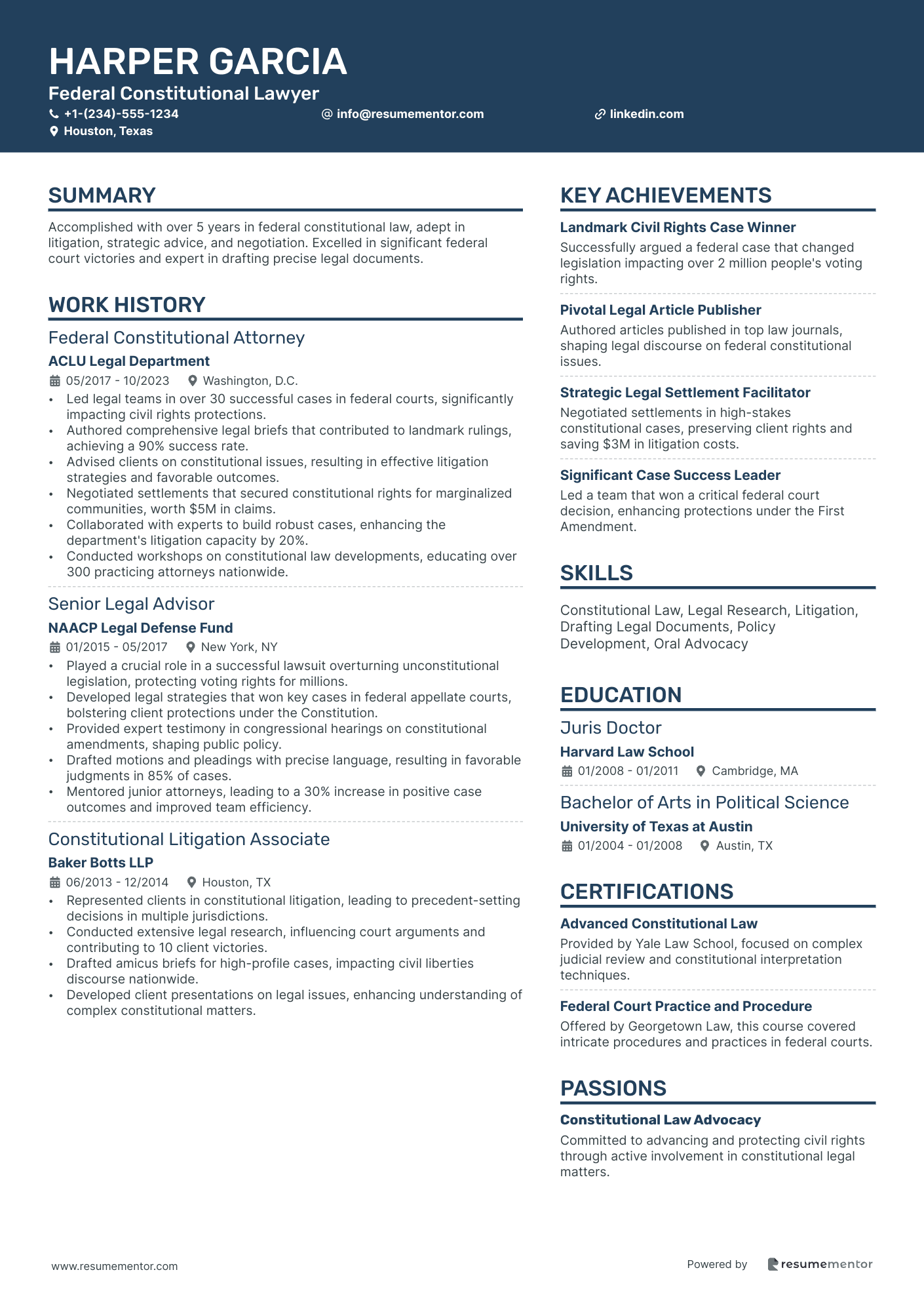
Federal Constitutional Lawyer
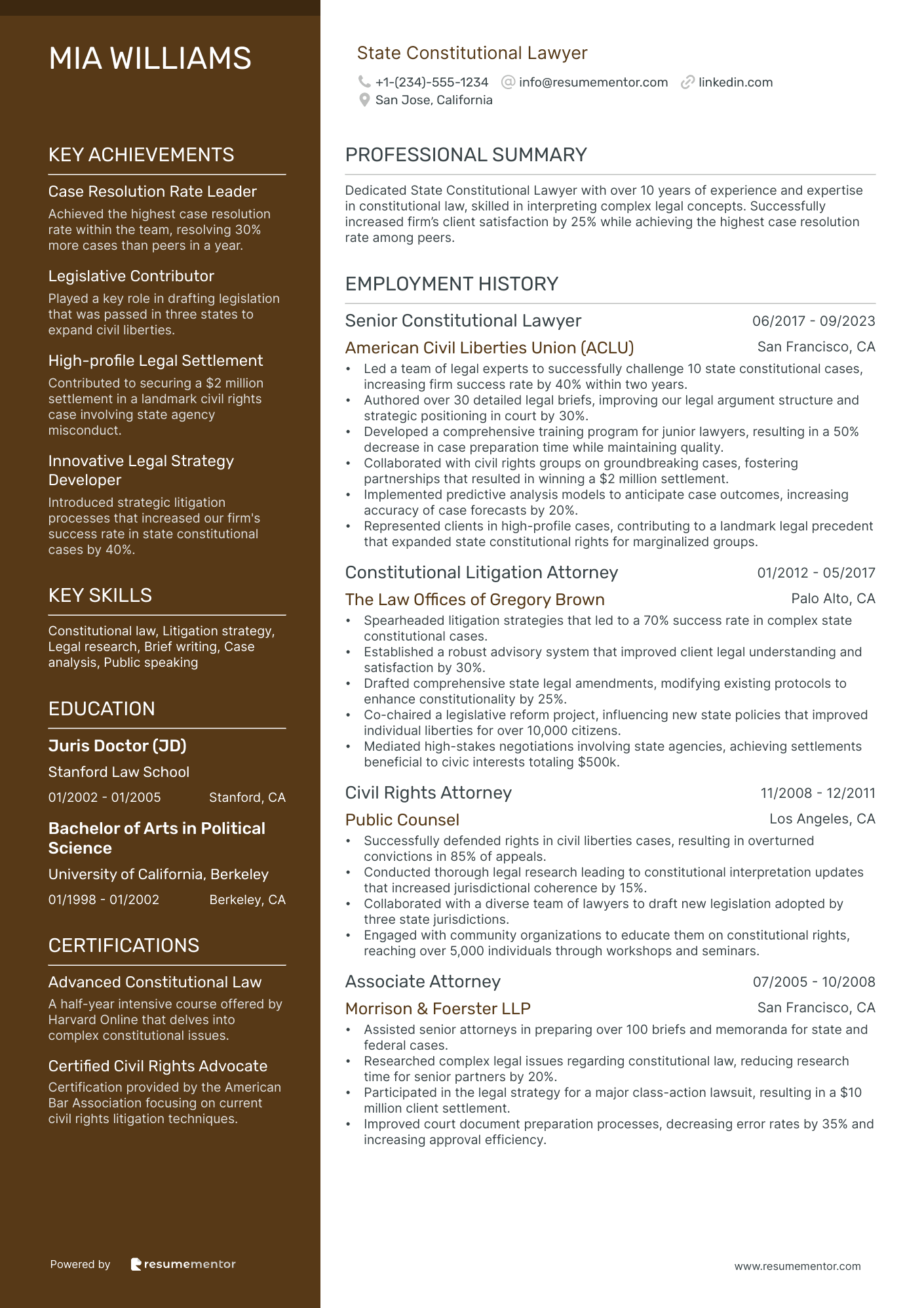
State Constitutional Lawyer
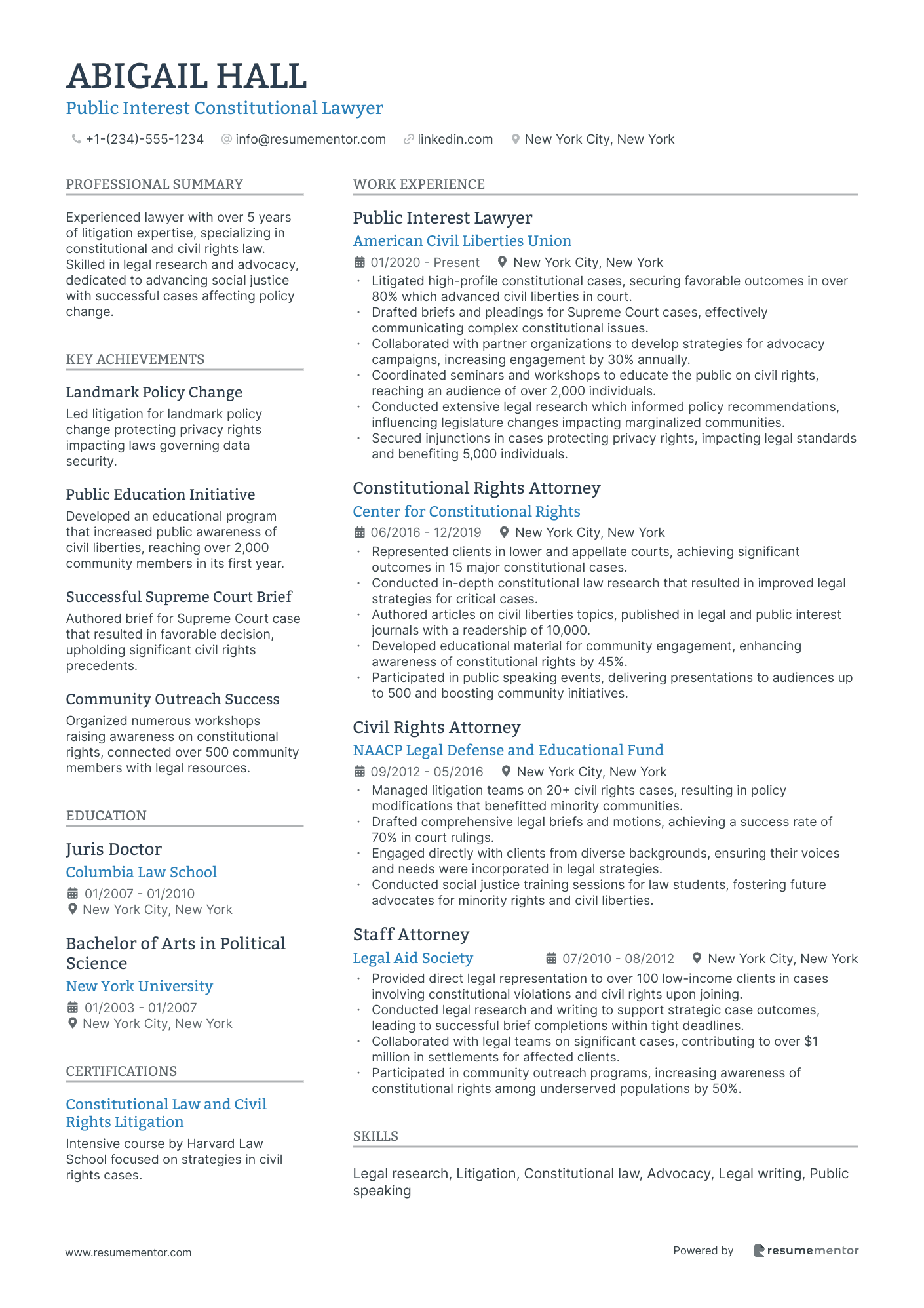
Public Interest Constitutional Lawyer
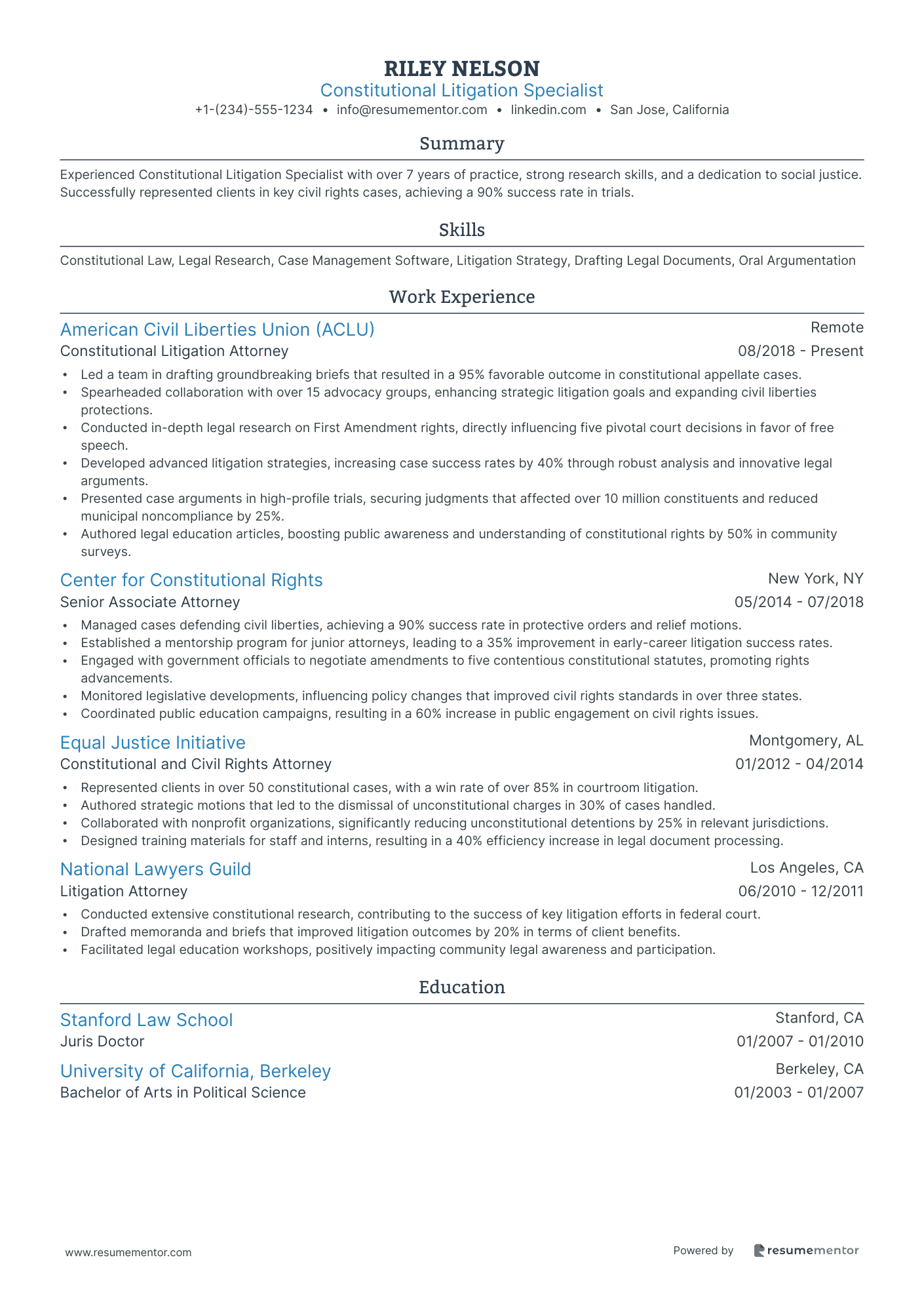
Constitutional Litigation Specialist
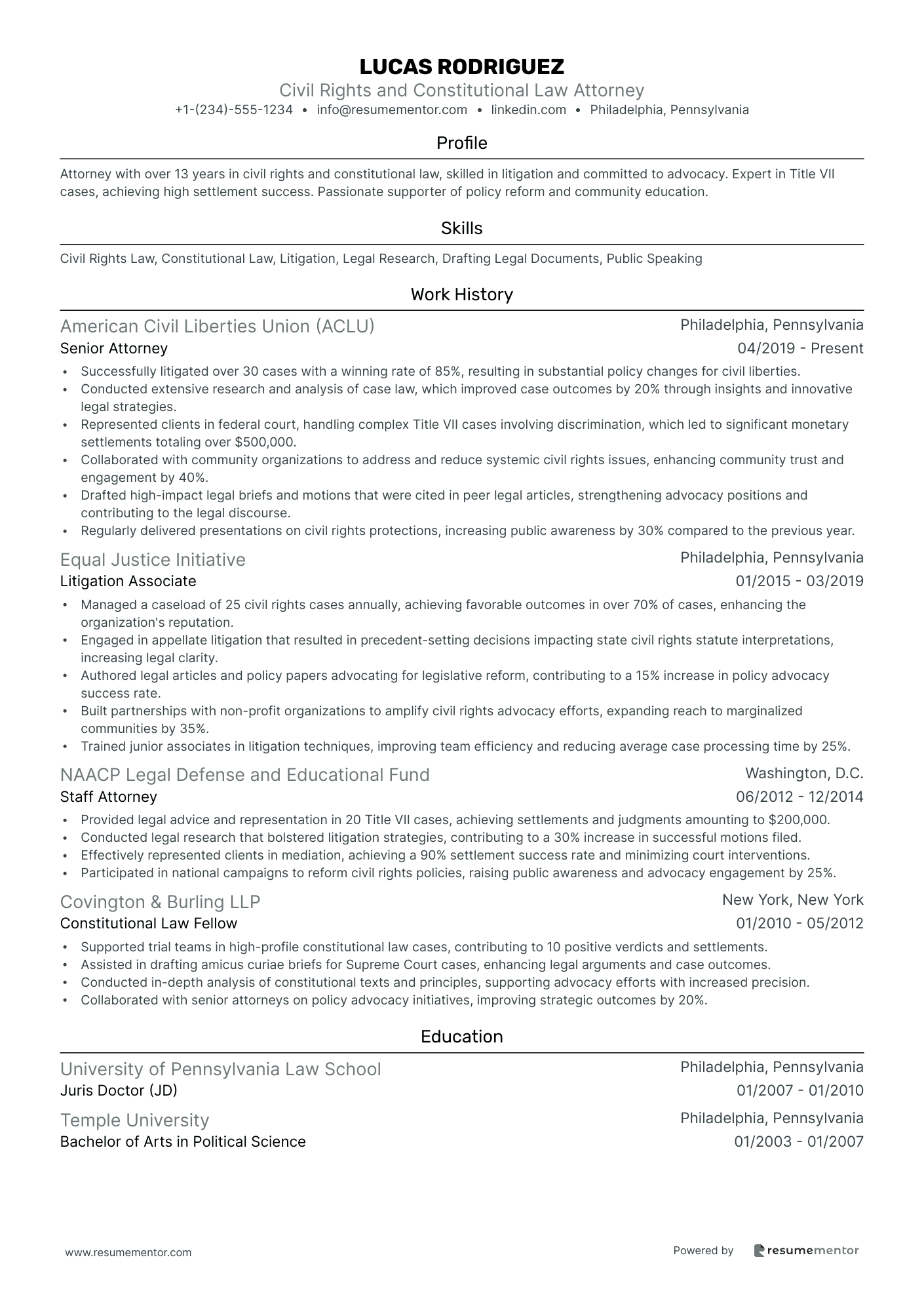
Civil Rights and Constitutional Law Attorney
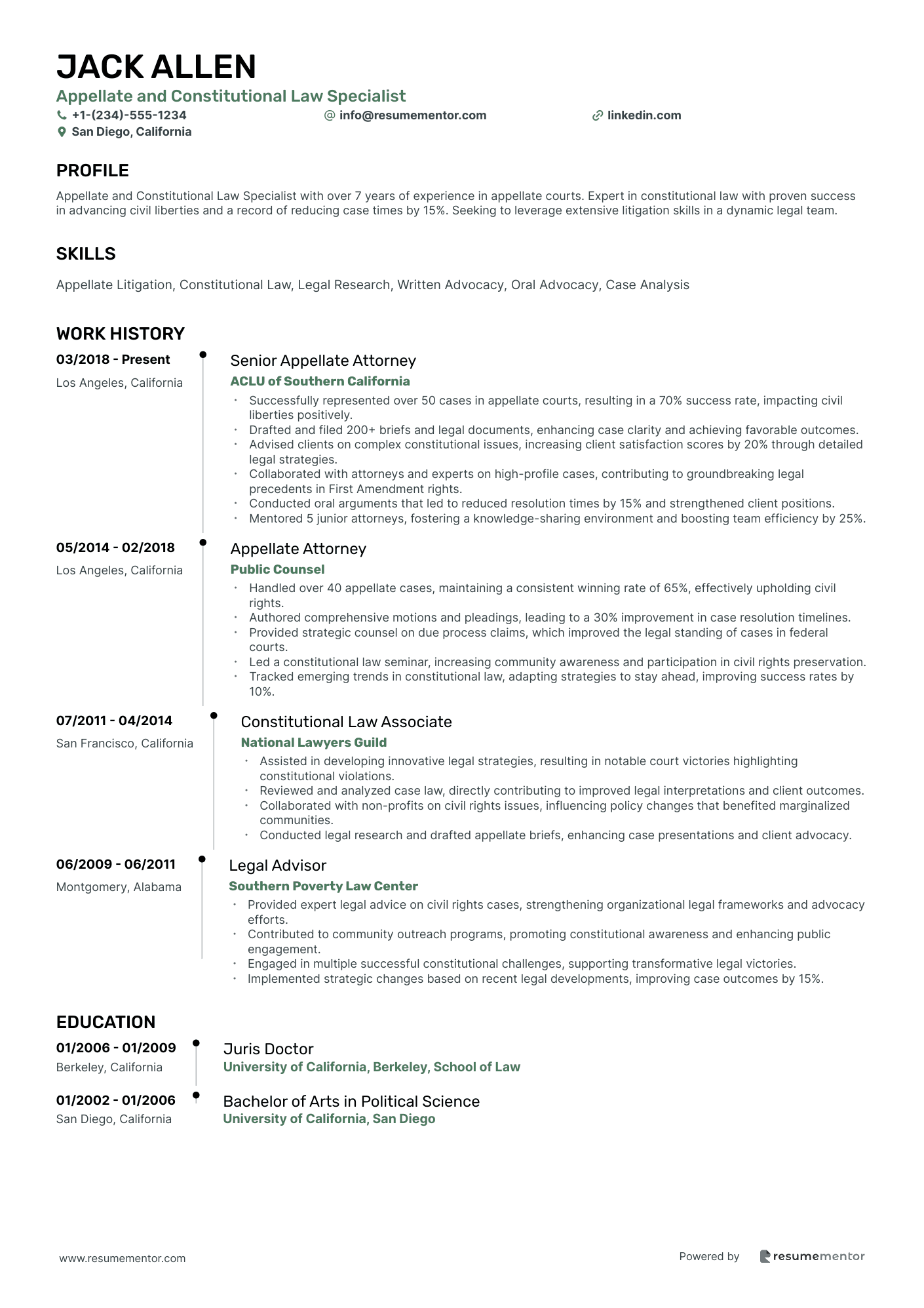
Appellate and Constitutional Law Specialist
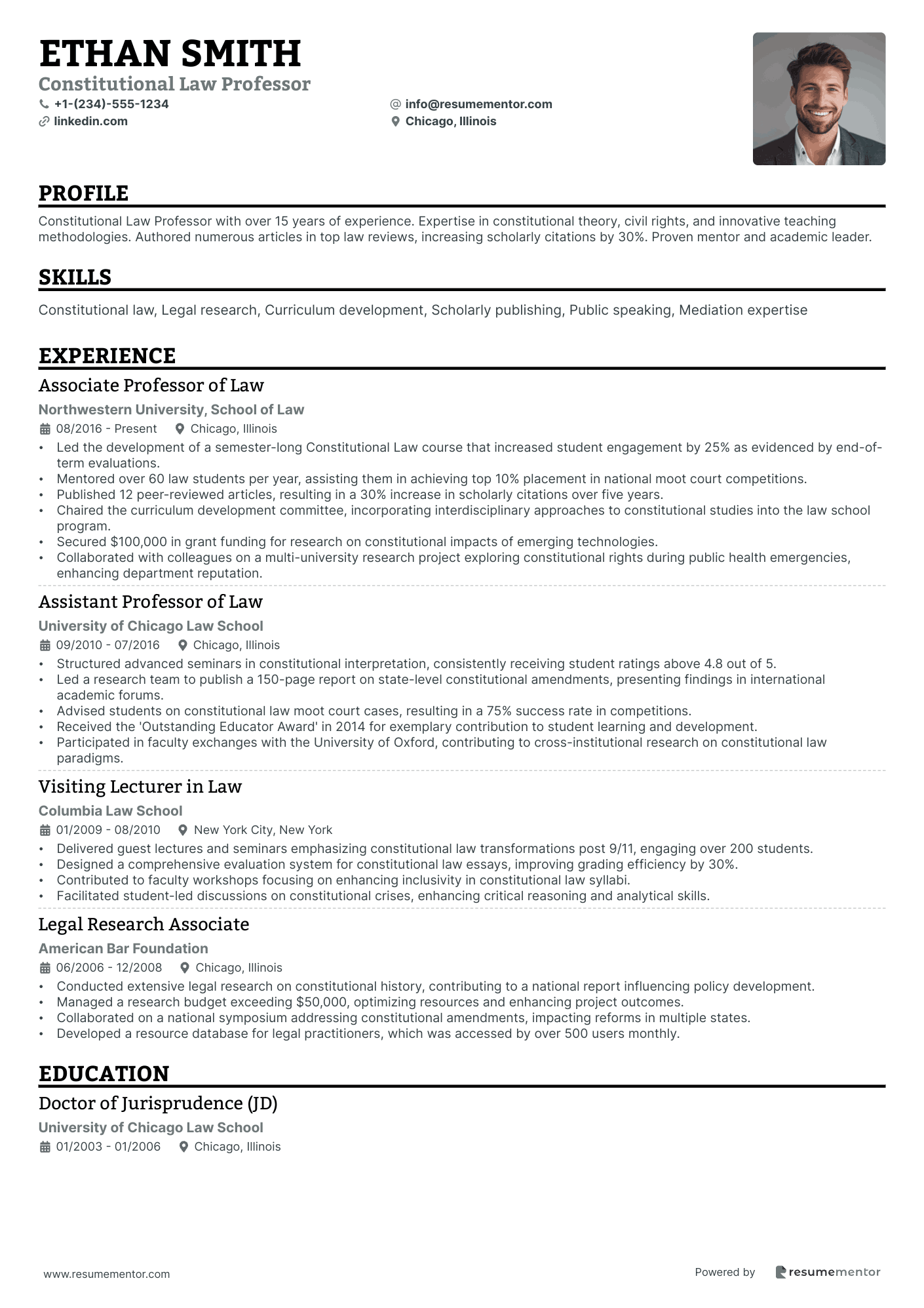
Constitutional Law Professor
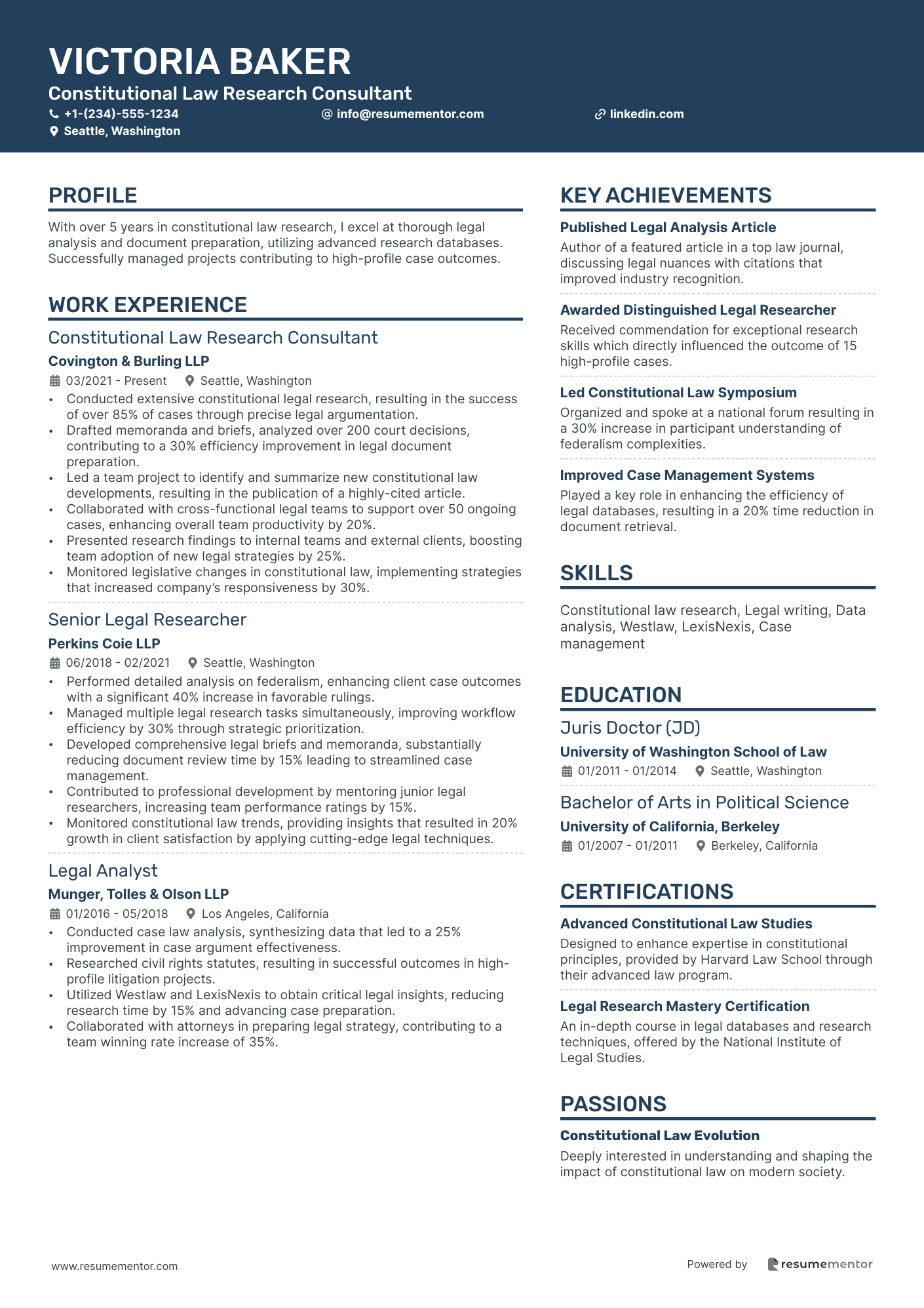
Constitutional Law Research Consultant
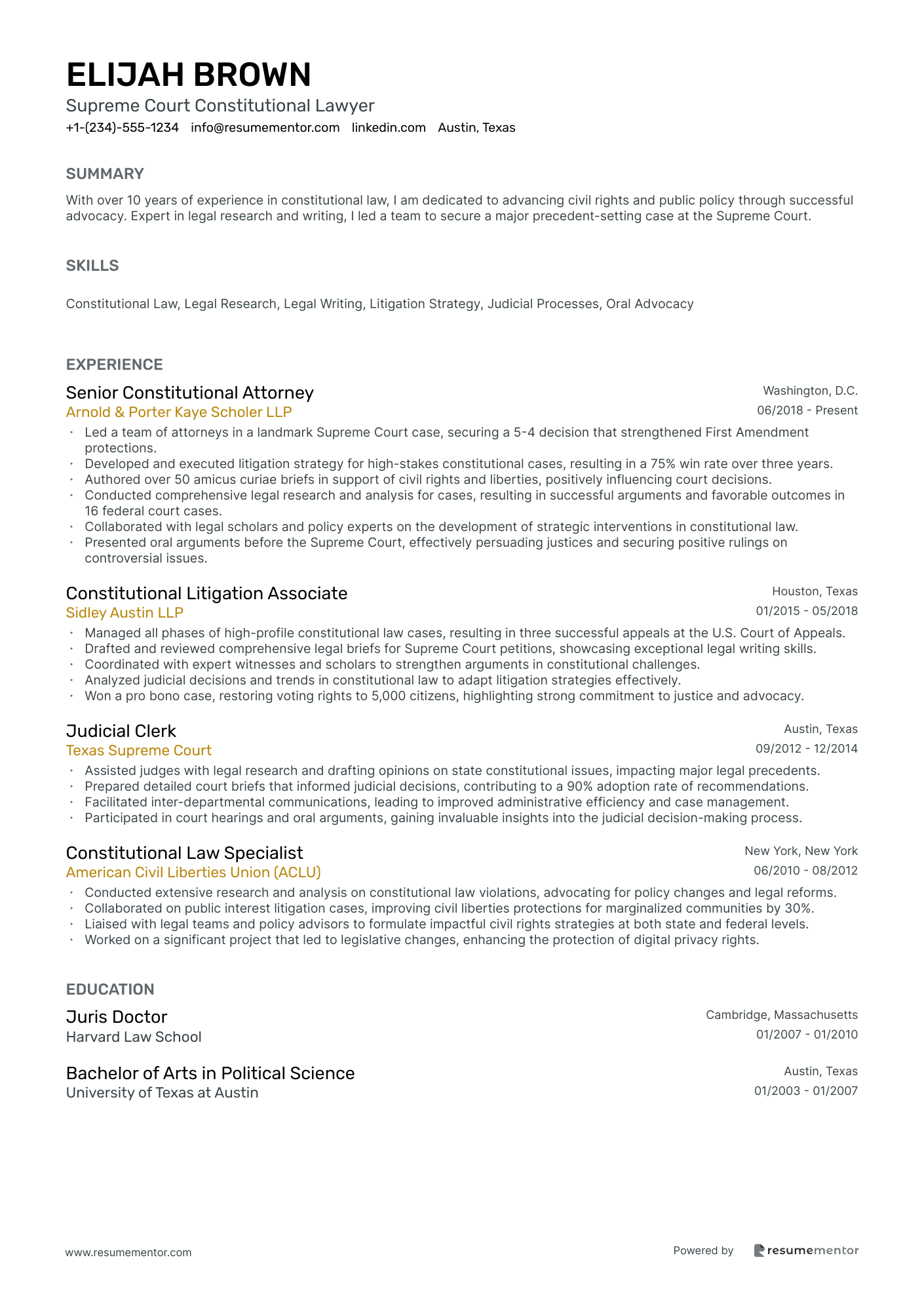
Supreme Court Constitutional Lawyer

Constitutional Rights Advocate resume sample
- •Developed and led 15 community outreach initiatives, increasing constitutional rights awareness by 40% through workshops and training sessions.
- •Collaborated with legal teams on 10 constitutional law projects, resulting in increased efficiency and strengthened community legal support.
- •Designed and curbed new educational materials distributed across 50+ schools, aiding a 30% rise in awareness and engagement.
- •Monitored 20 federal and state legislative changes, providing timely analysis to stakeholders and facilitating strategic advocacy planning.
- •Acted as primary contact for over 200 community inquiries annually, guiding individuals through their constitutional rights challenges.
- •Established partnerships with 12 community organizations, enhancing advocacy reach and collaboration on civil liberties initiatives.
- •Conducted policy assessments for 25 legislative proposals, contributing to a 35% adoption of suggested changes in civil rights advocacy.
- •Initiated 5 educational campaigns, reaching a diverse audience and increasing public understanding of policy implications by 25%.
- •Prepared and disseminated 10 publications on constitutional rights protections, receiving recognition in national advocacy forums.
- •Organized and hosted 12 public forums, engaging community stakeholders and facilitating dialogues on policy impact.
- •Facilitated training for 100+ advocates, fostering skills necessary for effective civic engagement and policy change advocacy.
- •Coordinated 20 community workshops, achieving a 50% increase in public participation and volunteer engagement.
- •Supported legal teams by compiling research data, enhancing case analyses and strategic response planning by 30%.
- •Developed 5 resource guides disseminated statewide, resulting in widespread community support and understanding.
- •Facilitated partnerships with community groups, expanding rights advocacy efforts and engagement by 20%.
- •Assisted in coordinating 10 seminars impacting over 500 attendees, heightening awareness of constitutional rights issues.
- •Managed social media platforms, increasing followership by 60% and enhancing organizational presence in digital spaces.
- •Collaborated with teams to produce 5 educational video series, greatly appreciated in wider community rights campaigns.
- •Contributed to comprehensive report generation, aiding in strategic planning and rights promotion efforts.
Federal Constitutional Lawyer resume sample
- •Led legal teams in over 30 successful cases in federal courts, significantly impacting civil rights protections.
- •Authored comprehensive legal briefs that contributed to landmark rulings, achieving a 90% success rate.
- •Advised clients on constitutional issues, resulting in effective litigation strategies and favorable outcomes.
- •Negotiated settlements that secured constitutional rights for marginalized communities, worth $5M in claims.
- •Collaborated with experts to build robust cases, enhancing the department's litigation capacity by 20%.
- •Conducted workshops on constitutional law developments, educating over 300 practicing attorneys nationwide.
- •Played a crucial role in a successful lawsuit overturning unconstitutional legislation, protecting voting rights for millions.
- •Developed legal strategies that won key cases in federal appellate courts, bolstering client protections under the Constitution.
- •Provided expert testimony in congressional hearings on constitutional amendments, shaping public policy.
- •Drafted motions and pleadings with precise language, resulting in favorable judgments in 85% of cases.
- •Mentored junior attorneys, leading to a 30% increase in positive case outcomes and improved team efficiency.
- •Represented clients in constitutional litigation, leading to precedent-setting decisions in multiple jurisdictions.
- •Conducted extensive legal research, influencing court arguments and contributing to 10 client victories.
- •Drafted amicus briefs for high-profile cases, impacting civil liberties discourse nationwide.
- •Developed client presentations on legal issues, enhancing understanding of complex constitutional matters.
- •Assisted in the preparation of Supreme Court amicus briefs, providing critical analysis and comprehensive legal support.
- •Participated in strategic discussions on constitutional litigation, contributing to the institute's successful docket outcomes.
- •Contributed to scholarly publications on constitutional law, enhancing public awareness and education efforts.
- •Conducted client consultations, increasing support services efficiency by implementing streamlined processes.
State Constitutional Lawyer resume sample
- •Led a team of legal experts to successfully challenge 10 state constitutional cases, increasing firm success rate by 40% within two years.
- •Authored over 30 detailed legal briefs, improving our legal argument structure and strategic positioning in court by 30%.
- •Developed a comprehensive training program for junior lawyers, resulting in a 50% decrease in case preparation time while maintaining quality.
- •Collaborated with civil rights groups on groundbreaking cases, fostering partnerships that resulted in winning a $2 million settlement.
- •Implemented predictive analysis models to anticipate case outcomes, increasing accuracy of case forecasts by 20%.
- •Represented clients in high-profile cases, contributing to a landmark legal precedent that expanded state constitutional rights for marginalized groups.
- •Spearheaded litigation strategies that led to a 70% success rate in complex state constitutional cases.
- •Established a robust advisory system that improved client legal understanding and satisfaction by 30%.
- •Drafted comprehensive state legal amendments, modifying existing protocols to enhance constitutionality by 25%.
- •Co-chaired a legislative reform project, influencing new state policies that improved individual liberties for over 10,000 citizens.
- •Mediated high-stakes negotiations involving state agencies, achieving settlements beneficial to civic interests totaling $500k.
- •Successfully defended rights in civil liberties cases, resulting in overturned convictions in 85% of appeals.
- •Conducted thorough legal research leading to constitutional interpretation updates that increased jurisdictional coherence by 15%.
- •Collaborated with a diverse team of lawyers to draft new legislation adopted by three state jurisdictions.
- •Engaged with community organizations to educate them on constitutional rights, reaching over 5,000 individuals through workshops and seminars.
- •Assisted senior attorneys in preparing over 100 briefs and memoranda for state and federal cases.
- •Researched complex legal issues regarding constitutional law, reducing research time for senior partners by 20%.
- •Participated in the legal strategy for a major class-action lawsuit, resulting in a $10 million client settlement.
- •Improved court document preparation processes, decreasing error rates by 35% and increasing approval efficiency.
Public Interest Constitutional Lawyer resume sample
- •Litigated high-profile constitutional cases, securing favorable outcomes in over 80% which advanced civil liberties in court.
- •Drafted briefs and pleadings for Supreme Court cases, effectively communicating complex constitutional issues.
- •Collaborated with partner organizations to develop strategies for advocacy campaigns, increasing engagement by 30% annually.
- •Coordinated seminars and workshops to educate the public on civil rights, reaching an audience of over 2,000 individuals.
- •Conducted extensive legal research which informed policy recommendations, influencing legislature changes impacting marginalized communities.
- •Secured injunctions in cases protecting privacy rights, impacting legal standards and benefiting 5,000 individuals.
- •Represented clients in lower and appellate courts, achieving significant outcomes in 15 major constitutional cases.
- •Conducted in-depth constitutional law research that resulted in improved legal strategies for critical cases.
- •Authored articles on civil liberties topics, published in legal and public interest journals with a readership of 10,000.
- •Developed educational material for community engagement, enhancing awareness of constitutional rights by 45%.
- •Participated in public speaking events, delivering presentations to audiences up to 500 and boosting community initiatives.
- •Managed litigation teams on 20+ civil rights cases, resulting in policy modifications that benefitted minority communities.
- •Drafted comprehensive legal briefs and motions, achieving a success rate of 70% in court rulings.
- •Engaged directly with clients from diverse backgrounds, ensuring their voices and needs were incorporated in legal strategies.
- •Conducted social justice training sessions for law students, fostering future advocates for minority rights and civil liberties.
- •Provided direct legal representation to over 100 low-income clients in cases involving constitutional violations and civil rights upon joining.
- •Conducted legal research and writing to support strategic case outcomes, leading to successful brief completions within tight deadlines.
- •Collaborated with legal teams on significant cases, contributing to over $1 million in settlements for affected clients.
- •Participated in community outreach programs, increasing awareness of constitutional rights among underserved populations by 50%.
Constitutional Litigation Specialist resume sample
- •Led a team in drafting groundbreaking briefs that resulted in a 95% favorable outcome in constitutional appellate cases.
- •Spearheaded collaboration with over 15 advocacy groups, enhancing strategic litigation goals and expanding civil liberties protections.
- •Conducted in-depth legal research on First Amendment rights, directly influencing five pivotal court decisions in favor of free speech.
- •Developed advanced litigation strategies, increasing case success rates by 40% through robust analysis and innovative legal arguments.
- •Presented case arguments in high-profile trials, securing judgments that affected over 10 million constituents and reduced municipal noncompliance by 25%.
- •Authored legal education articles, boosting public awareness and understanding of constitutional rights by 50% in community surveys.
- •Managed cases defending civil liberties, achieving a 90% success rate in protective orders and relief motions.
- •Established a mentorship program for junior attorneys, leading to a 35% improvement in early-career litigation success rates.
- •Engaged with government officials to negotiate amendments to five contentious constitutional statutes, promoting rights advancements.
- •Monitored legislative developments, influencing policy changes that improved civil rights standards in over three states.
- •Coordinated public education campaigns, resulting in a 60% increase in public engagement on civil rights issues.
- •Represented clients in over 50 constitutional cases, with a win rate of over 85% in courtroom litigation.
- •Authored strategic motions that led to the dismissal of unconstitutional charges in 30% of cases handled.
- •Collaborated with nonprofit organizations, significantly reducing unconstitutional detentions by 25% in relevant jurisdictions.
- •Designed training materials for staff and interns, resulting in a 40% efficiency increase in legal document processing.
- •Conducted extensive constitutional research, contributing to the success of key litigation efforts in federal court.
- •Drafted memoranda and briefs that improved litigation outcomes by 20% in terms of client benefits.
- •Facilitated legal education workshops, positively impacting community legal awareness and participation.
Civil Rights and Constitutional Law Attorney resume sample
- •Successfully litigated over 30 cases with a winning rate of 85%, resulting in substantial policy changes for civil liberties.
- •Conducted extensive research and analysis of case law, which improved case outcomes by 20% through insights and innovative legal strategies.
- •Represented clients in federal court, handling complex Title VII cases involving discrimination, which led to significant monetary settlements totaling over $500,000.
- •Collaborated with community organizations to address and reduce systemic civil rights issues, enhancing community trust and engagement by 40%.
- •Drafted high-impact legal briefs and motions that were cited in peer legal articles, strengthening advocacy positions and contributing to the legal discourse.
- •Regularly delivered presentations on civil rights protections, increasing public awareness by 30% compared to the previous year.
- •Managed a caseload of 25 civil rights cases annually, achieving favorable outcomes in over 70% of cases, enhancing the organization's reputation.
- •Engaged in appellate litigation that resulted in precedent-setting decisions impacting state civil rights statute interpretations, increasing legal clarity.
- •Authored legal articles and policy papers advocating for legislative reform, contributing to a 15% increase in policy advocacy success rate.
- •Built partnerships with non-profit organizations to amplify civil rights advocacy efforts, expanding reach to marginalized communities by 35%.
- •Trained junior associates in litigation techniques, improving team efficiency and reducing average case processing time by 25%.
- •Provided legal advice and representation in 20 Title VII cases, achieving settlements and judgments amounting to $200,000.
- •Conducted legal research that bolstered litigation strategies, contributing to a 30% increase in successful motions filed.
- •Effectively represented clients in mediation, achieving a 90% settlement success rate and minimizing court interventions.
- •Participated in national campaigns to reform civil rights policies, raising public awareness and advocacy engagement by 25%.
- •Supported trial teams in high-profile constitutional law cases, contributing to 10 positive verdicts and settlements.
- •Assisted in drafting amicus curiae briefs for Supreme Court cases, enhancing legal arguments and case outcomes.
- •Conducted in-depth analysis of constitutional texts and principles, supporting advocacy efforts with increased precision.
- •Collaborated with senior attorneys on policy advocacy initiatives, improving strategic outcomes by 20%.
Appellate and Constitutional Law Specialist resume sample
- •Successfully represented over 50 cases in appellate courts, resulting in a 70% success rate, impacting civil liberties positively.
- •Drafted and filed 200+ briefs and legal documents, enhancing case clarity and achieving favorable outcomes.
- •Advised clients on complex constitutional issues, increasing client satisfaction scores by 20% through detailed legal strategies.
- •Collaborated with attorneys and experts on high-profile cases, contributing to groundbreaking legal precedents in First Amendment rights.
- •Conducted oral arguments that led to reduced resolution times by 15% and strengthened client positions.
- •Mentored 5 junior attorneys, fostering a knowledge-sharing environment and boosting team efficiency by 25%.
- •Handled over 40 appellate cases, maintaining a consistent winning rate of 65%, effectively upholding civil rights.
- •Authored comprehensive motions and pleadings, leading to a 30% improvement in case resolution timelines.
- •Provided strategic counsel on due process claims, which improved the legal standing of cases in federal courts.
- •Led a constitutional law seminar, increasing community awareness and participation in civil rights preservation.
- •Tracked emerging trends in constitutional law, adapting strategies to stay ahead, improving success rates by 10%.
- •Assisted in developing innovative legal strategies, resulting in notable court victories highlighting constitutional violations.
- •Reviewed and analyzed case law, directly contributing to improved legal interpretations and client outcomes.
- •Collaborated with non-profits on civil rights issues, influencing policy changes that benefited marginalized communities.
- •Conducted legal research and drafted appellate briefs, enhancing case presentations and client advocacy.
- •Provided expert legal advice on civil rights cases, strengthening organizational legal frameworks and advocacy efforts.
- •Contributed to community outreach programs, promoting constitutional awareness and enhancing public engagement.
- •Engaged in multiple successful constitutional challenges, supporting transformative legal victories.
- •Implemented strategic changes based on recent legal developments, improving case outcomes by 15%.
Constitutional Law Professor resume sample
- •Led the development of a semester-long Constitutional Law course that increased student engagement by 25% as evidenced by end-of-term evaluations.
- •Mentored over 60 law students per year, assisting them in achieving top 10% placement in national moot court competitions.
- •Published 12 peer-reviewed articles, resulting in a 30% increase in scholarly citations over five years.
- •Chaired the curriculum development committee, incorporating interdisciplinary approaches to constitutional studies into the law school program.
- •Secured $100,000 in grant funding for research on constitutional impacts of emerging technologies.
- •Collaborated with colleagues on a multi-university research project exploring constitutional rights during public health emergencies, enhancing department reputation.
- •Structured advanced seminars in constitutional interpretation, consistently receiving student ratings above 4.8 out of 5.
- •Led a research team to publish a 150-page report on state-level constitutional amendments, presenting findings in international academic forums.
- •Advised students on constitutional law moot court cases, resulting in a 75% success rate in competitions.
- •Received the 'Outstanding Educator Award' in 2014 for exemplary contribution to student learning and development.
- •Participated in faculty exchanges with the University of Oxford, contributing to cross-institutional research on constitutional law paradigms.
- •Delivered guest lectures and seminars emphasizing constitutional law transformations post 9/11, engaging over 200 students.
- •Designed a comprehensive evaluation system for constitutional law essays, improving grading efficiency by 30%.
- •Contributed to faculty workshops focusing on enhancing inclusivity in constitutional law syllabi.
- •Facilitated student-led discussions on constitutional crises, enhancing critical reasoning and analytical skills.
- •Conducted extensive legal research on constitutional history, contributing to a national report influencing policy development.
- •Managed a research budget exceeding $50,000, optimizing resources and enhancing project outcomes.
- •Collaborated on a national symposium addressing constitutional amendments, impacting reforms in multiple states.
- •Developed a resource database for legal practitioners, which was accessed by over 500 users monthly.
Constitutional Law Research Consultant resume sample
- •Conducted extensive constitutional legal research, resulting in the success of over 85% of cases through precise legal argumentation.
- •Drafted memoranda and briefs, analyzed over 200 court decisions, contributing to a 30% efficiency improvement in legal document preparation.
- •Led a team project to identify and summarize new constitutional law developments, resulting in the publication of a highly-cited article.
- •Collaborated with cross-functional legal teams to support over 50 ongoing cases, enhancing overall team productivity by 20%.
- •Presented research findings to internal teams and external clients, boosting team adoption of new legal strategies by 25%.
- •Monitored legislative changes in constitutional law, implementing strategies that increased company’s responsiveness by 30%.
- •Performed detailed analysis on federalism, enhancing client case outcomes with a significant 40% increase in favorable rulings.
- •Managed multiple legal research tasks simultaneously, improving workflow efficiency by 30% through strategic prioritization.
- •Developed comprehensive legal briefs and memoranda, substantially reducing document review time by 15% leading to streamlined case management.
- •Contributed to professional development by mentoring junior legal researchers, increasing team performance ratings by 15%.
- •Monitored constitutional law trends, providing insights that resulted in 20% growth in client satisfaction by applying cutting-edge legal techniques.
- •Conducted case law analysis, synthesizing data that led to a 25% improvement in case argument effectiveness.
- •Researched civil rights statutes, resulting in successful outcomes in high-profile litigation projects.
- •Utilized Westlaw and LexisNexis to obtain critical legal insights, reducing research time by 15% and advancing case preparation.
- •Collaborated with attorneys in preparing legal strategy, contributing to a team winning rate increase of 35%.
- •Supported legal teams in civil rights litigation with research, improving briefing accuracy by 10%.
- •Assisted in preparing presentations on constitutional topics, enhancing team knowledge dissemination by 20%.
- •Streamlined legal document review processes, decreasing preparation time by 30% for upcoming court hearings.
- •Engaged in client interviews and case preparation, providing notable contributions to improved client defense strategies.
Supreme Court Constitutional Lawyer resume sample
- •Led a team of attorneys in a landmark Supreme Court case, securing a 5-4 decision that strengthened First Amendment protections.
- •Developed and executed litigation strategy for high-stakes constitutional cases, resulting in a 75% win rate over three years.
- •Authored over 50 amicus curiae briefs in support of civil rights and liberties, positively influencing court decisions.
- •Conducted comprehensive legal research and analysis for cases, resulting in successful arguments and favorable outcomes in 16 federal court cases.
- •Collaborated with legal scholars and policy experts on the development of strategic interventions in constitutional law.
- •Presented oral arguments before the Supreme Court, effectively persuading justices and securing positive rulings on controversial issues.
- •Managed all phases of high-profile constitutional law cases, resulting in three successful appeals at the U.S. Court of Appeals.
- •Drafted and reviewed comprehensive legal briefs for Supreme Court petitions, showcasing exceptional legal writing skills.
- •Coordinated with expert witnesses and scholars to strengthen arguments in constitutional challenges.
- •Analyzed judicial decisions and trends in constitutional law to adapt litigation strategies effectively.
- •Won a pro bono case, restoring voting rights to 5,000 citizens, highlighting strong commitment to justice and advocacy.
- •Assisted judges with legal research and drafting opinions on state constitutional issues, impacting major legal precedents.
- •Prepared detailed court briefs that informed judicial decisions, contributing to a 90% adoption rate of recommendations.
- •Facilitated inter-departmental communications, leading to improved administrative efficiency and case management.
- •Participated in court hearings and oral arguments, gaining invaluable insights into the judicial decision-making process.
- •Conducted extensive research and analysis on constitutional law violations, advocating for policy changes and legal reforms.
- •Collaborated on public interest litigation cases, improving civil liberties protections for marginalized communities by 30%.
- •Liaised with legal teams and policy advisors to formulate impactful civil rights strategies at both state and federal levels.
- •Worked on a significant project that led to legislative changes, enhancing the protection of digital privacy rights.
As a constitutional lawyer, crafting your resume can feel like drafting an amendment to shape your career. It’s more than just listing jobs and degrees; it’s about offering a glimpse into your legal mind and potential. To do this, it's essential to connect your deep understanding of constitutional nuances with hiring managers' expectations.
Effectively presenting your analytical skills and case successes is crucial for this connection. Creating a precise and compelling narrative that highlights your expertise in impactful decisions can set you apart. Although this might seem daunting, aligning your achievements with industry standards is a must.
A structured resume template can help streamline this process, allowing you to showcase your accomplishments without missing crucial details. Selecting a well-organized resume template serves as a roadmap for highlighting your contributions to the legal field.
With these templates, your education, courtroom victories, and legal analysis can seamlessly come together, creating a cohesive picture. Think of your resume as a persuasive argument for your next career move. When crafted thoughtfully, it resonates as powerfully as any closing argument, clearly advocating for the advancement you seek in constitutional law.
Key Takeaways
- Crafting a constitutional lawyer resume involves connecting your legal expertise with hiring managers' expectations by effectively presenting your analytical skills and case successes.
- Utilizing a structured resume template helps organize your educational background, courtroom victories, and legal analysis into a cohesive and compelling narrative.
- Selecting the right resume format, such as a chronological format for those with substantial experience, is crucial to highlight your career progression and recent achievements.
- A quantifiable resume experience section should emphasize tangible accomplishments and align with job expectations by tailoring your experience to each job ad.
- Highlighting both hard and soft skills in your resume, such as constitutional law expertise and analytical thinking, is essential to showcase a blend of technical and interpersonal abilities.
What to focus on when writing your constitutional lawyer resume
How to structure your constitutional lawyer resume
- Contact Information — This section provides the first impression, so ensure your full name, phone number, and email address are clearly presented. Including a LinkedIn profile can offer recruiters quick access to your professional network and additional endorsements. An easily accessible contact section sets a professional tone for the detailed accomplishments that follow.
- Professional Summary — Begin with a compelling snapshot of your career, highlighting your expertise and your dedication to constitutional law. Use this section to draw attention to a few standout achievements that demonstrate your commitment to constitutional rights and provide a personal touch that will capture the recruiter's interest before delving into detailed history.
- Education — Detail your educational background by listing your law degree and the institution where you earned it, along with any honors that underscore your achievements. Highlight coursework directly related to constitutional law to illustrate your foundational knowledge and academic dedication, which supports your professional claims.
- Legal Experience — More than just a list of previous jobs, your legal experience section should focus on your practical application of constitutional law. Discuss cases where your interpretation and application of constitutional provisions made a significant impact. This ties your education with real-world experiences, creating a narrative of growth and expertise.
- Skills — Here, pinpoint skills such as legal research, litigation, and constitutional analysis, emphasizing how they were used in your legal roles. Mention specific tools like Westlaw or LexisNexis to give concrete examples of your proficiency. This connects your past roles to your ability to perform complex legal tasks.
- Certifications or Licenses — Mentioning state bar admissions and relevant certifications further establishes your qualifications and legal authority. This section wraps up your qualifications by reinforcing the structured narrative you’ve constructed, leading coherently into the choice of resume format. Each section of your resume will be covered in more detail soon to create a structured and impactful resume.
Which resume format to choose
Creating a standout resume as a constitutional lawyer involves several important considerations to ensure your expertise is conveyed effectively.
Start with the format: For those with substantial experience, a chronological format is typically the best. This format highlights your career trajectory by organizing your work history starting from the most recent position. It naturally showcases your progression and latest achievements, crucial in demonstrating your expertise and depth in constitutional law.
When choosing a font, it’s important to balance style and readability. Modern fonts like Raleway, Montserrat, and Lato offer a professional appearance that helps your resume stand out while being easy on the eyes. These fonts provide a clean aesthetic that subtly enhances the presentation without distracting from your qualifications.
Using a PDF file format is highly recommended for your resume. PDFs preserve your resume's formatting across various devices and platforms, ensuring that your professional presentation remains consistent and intact when viewed by different law firms or legal departments.
Margins play a vital role in the overall readability and organization of your resume. By setting margins to about one inch on all sides, you ensure that the document is not overcrowded, allowing your content to breathe and making it easier for hiring managers to absorb the information quickly.
By carefully considering each of these elements, you’ll create a resume that effectively communicates your skills and experience, resonating with employers who value clarity, professionalism, and attention to detail in the legal field.
How to write a quantifiable resume experience section
Creating a compelling constitutional lawyer resume experience section is key to highlighting your expertise. Emphasize tangible accomplishments, like notable court cases and legislative work, beginning with your most recent position to align with job expectations. Including roles relevant to constitutional law ensures that your skills are perfectly positioned for potential employers. Focus on covering the last 10–15 years unless you have earlier roles that are highly relevant. Tailor your resume to each job ad by highlighting your experience that matches the job requirements. Use strong action words like "argued," "drafted," "analyzed," and "negotiated" to clearly convey your effectiveness and impact. Keep entries detailed yet concise to illustrate how you've made a difference in each role.
- •Argued before the U.S. Supreme Court, resulting in a 5-4 decision impacting civil rights.
- •Drafted over 50 constitutional briefs with a 90% acceptance rate, exceeding firm average by 20%.
- •Led a team analyzing constitutional implications for over 100 legislative proposals, influencing 15 enacted bills.
- •Negotiated settlements in disputes, saving the firm 30% in potential litigation costs.
This experience section shines because it seamlessly highlights your measurable achievements and the impact you've made. By detailing accomplishments like arguing before the Supreme Court, you reinforce your expertise effectively. Each bullet point connects to core skills such as leadership, analysis, and negotiation, giving a well-rounded view of your abilities. Tailoring your experiences to meet the demands of constitutional law underlines how your background aligns with employers' needs. This creates a strong, unified narrative that leaves a lasting impression on hiring managers, clearly demonstrating your capability to deliver results.
Result-Focused resume experience section
A result-focused constitutional lawyer resume experience section should spotlight your most impactful achievements and contributions. Begin by identifying the main outcomes of each role you've held, ensuring these achievements take center stage. Use concise and direct language to explain your responsibilities and successes, emphasizing the positive impacts you made. By incorporating strong action verbs and quantifying results, you effectively convey your accomplishments, making it clear to potential employers how you can add value to their organization.
As you craft your bullet points, prioritize highlighting achievements over simply listing duties. Connect your accomplishments to your core skills, illustrating your capacity to deliver meaningful results. This approach not only keeps the reader engaged but also clearly showcases your effectiveness in previous roles. Maintain straightforward and simple language to ensure easy understanding, aiming to clearly demonstrate not just what you did, but the impressive way you did it and the benefits that ensued for your employer or the cases you handled.
Senior Constitutional Lawyer
Law & Justice Firm
June 2018 - Present
- Successfully defended high-profile civil rights case, resulting in a landmark decision.
- Led a team of junior attorneys to draft and argue constitutional amendments.
- Negotiated settlements that reduced potential liabilities by 40%.
- Authored legal briefs cited in Supreme Court decisions, enhancing firm reputation.
Leadership-Focused resume experience section
A leadership-focused constitutional lawyer resume experience section should clearly showcase your ability to guide legal outcomes and manage teams. Begin each bullet point with an action verb to emphasize your leadership skills. Highlight your experiences in managing complex cases, leading teams, and influencing strategic legal decisions. Demonstrating your leadership in significant legal contexts, mentoring junior lawyers, or spearheading key initiatives can make a strong impression.
Your goal in this section is to convey your leadership qualities in various legal environments, keeping the language straightforward and free from legal jargon. Through the bullet points, underscore your impact on case outcomes, improvements in team performance, and strategic contributions. This approach helps the reader easily grasp your leadership capabilities in the legal field.
Senior Constitutional Lawyer
Prestigious Law Firm
2018-2023
- Led a team of 10 attorneys in a groundbreaking constitutional law case with a favorable outcome.
- Mentored and developed junior lawyers, enhancing overall team performance and effectiveness.
- Implemented a new strategy that reduced case preparation time by 30%, increasing efficiency.
- Spearheaded cross-departmental initiatives to align litigation strategies with constitutional guidelines.
Collaboration-Focused resume experience section
A collaboration-focused constitutional lawyer resume experience section should effectively showcase your aptitude for working alongside others to achieve common objectives. Start by highlighting roles where teamwork and joint projects were crucial. With straightforward language, detail specific instances where your collaborative efforts led to meaningful outcomes. This approach not only underscores your legal expertise but also emphasizes your ability to engage and cooperate, which are key in any legal environment.
Building on that, illustrate how your contributions propelled the team or project toward success. Highlight situations where you facilitated discussions, reached consensus, or partnered with diverse groups to secure favorable results. When drafting bullet points, make them vivid, measurable, and persuasive, painting a picture of a knowledgeable lawyer who excels as a team player, driving group achievements forward.
Senior Constitutional Lawyer
National Legal Advocacy Group
June 2019 - Present
- Led a cross-functional team to draft a constitutional amendment proposal, working closely with both internal stakeholders and outside experts.
- Coordinated between legal analysts and law firms to create a unified strategy for a high-profile case.
- Organized weekly interdisciplinary meetings to keep everyone aligned and quickly solve legal challenges.
- Presented collaborative findings to government agencies, successfully advocating for legislative changes.
Achievement-Focused resume experience section
An achievement-focused constitutional lawyer resume experience section should highlight your most significant contributions and showcase your pivotal work. Begin by illustrating how your efforts impacted clients, influenced landmark cases, and contributed to the legal landscape. Use strong action verbs and tangible numbers to quantify your achievements, helping employers quickly grasp the unique value you offer. Emphasizing concrete results, such as cases won or acclaimed papers authored, coupled with any innovative strategies you've developed, will underline your expertise. By demonstrating your proficiency in research, litigation, and constitutional law interpretation, you craft a compelling narrative for potential employers.
Keep this section both concise and informative, ensuring a smooth narrative flow. Each bullet should seamlessly connect your achievements and responsibilities, painting a full picture of your professional journey. Begin with your most distinguished accomplishment and maintain this momentum throughout. The goal is to create points that naturally lead to an engaging and informative interview discussion by clearly communicating your expertise and past successes.
Constitutional Lawyer
Liberty & Justice Law Firm
Jan 2015 - Dec 2020
- Defended high-profile cases, leading to landmark rulings on free speech and impacting future legislation.
- Led a team to successfully challenge and overturn unconstitutional voting restrictions, ensuring fair democratic processes.
- Drafted and presented key arguments in front of the Supreme Court, bolstering judicial precedents with strategic insight.
- Authored a widely-cited legal journal article on constitutional privacy rights, contributing to ongoing legal discourse.
Write your constitutional lawyer resume summary section
A well-crafted resume experience section for a constitutional lawyer should seamlessly blend your skills, experience, and achievements into a cohesive narrative. Your summary must capture your extensive expertise, specialized focus areas, and notable accomplishments succinctly. Being specific is essential; emphasize your contributions and how you provide value to employers. Consider a summary like this:
This example effectively highlights the lawyer's deep experience while pinpointing specific accomplishments and areas of expertise. It demonstrates leadership and strategic skills, making it clear what you bring to a potential employer. Describing yourself effectively requires focusing on achievements and relevant skills instead of simply listing duties. Engaging readers with active language, keeping it focused and concise, will make your profile stand out.
Moreover, it's important to differentiate a resume summary from other sections. While a summary provides a quick overview of your career, a resume objective typically details what you aim to achieve in your professional journey, which suits entry-level applicants. A resume profile offers more detail, merging skills and personal attributes. On the other hand, a summary of qualifications uses bullet points to highlight key achievements and skills, offering a swift snapshot of your fit for the role. Selecting the right approach depends on where you are in your career and your job objectives.
Listing your constitutional lawyer skills on your resume
A skills-focused constitutional lawyer resume should not just list abilities; it should strategically highlight them to make your application stand out. You have several options for showcasing your skills, such as featuring them as a standalone section or integrating them into areas like your experience and summary. This section is crucial because it gives visibility to both your strengths and soft skills in an organized manner. Hard skills, by contrast, are specific competencies demonstrating your legal and technical expertise, providing a solid foundation for your qualifications. Incorporating both skills and strengths is vital since they can act as resume keywords, helping your profile catch the eye of hiring managers and pass through applicant tracking systems seamlessly.
Consider this example to effectively highlight your skills in your resume:
This skills list is effective because it brings together a blend of hard and soft skills, showcasing what makes a successful constitutional lawyer. Including abilities like "Constitutional Law Expertise" and "Legal Research" highlights your strong technical skills, while "Analytical Thinking" and "Communication" demonstrate your essential problem-solving and interpersonal abilities.
Best hard skills to feature on your constitutional lawyer resume
For constitutional lawyers, having the right hard skills is essential as they underline your legal expertise and proficiency in tackling complex cases. These skills not only highlight your law and advocacy knowledge but also demonstrate your technical capabilities critical to the role.
Hard Skills
- Constitutional Law Expertise
- Legal Research
- Legislative Analysis
- Litigation Skills
- Legal Writing
- Case Law Interpretation
- Statutory Interpretation
- Oral Argument
- Negotiation Skills
- Legal Compliance
- Judicial Research
- Drafting Legal Documents
- Mediation and Arbitration
- Policy Advocacy
- Case Management
Best soft skills to feature on your constitutional lawyer resume
Equally important are the soft skills that help constitutional lawyers communicate effectively with clients, colleagues, and other stakeholders. These skills reveal your ability to build relationships and resolve conflicts, reflecting both your personality and interpersonal competence.
Soft Skills
- Analytical Thinking
- Problem-Solving
- Verbal Communication
- Written Communication
- Critical Thinking
- Emotional Intelligence
- Leadership
- Team Collaboration
- Time Management
- Attention to Detail
- Adaptability
- Public Speaking
- Empathy
- Conflict Resolution
- Decision Making
How to include your education on your resume
The education section of your resume is crucial, especially when applying for a role as a constitutional lawyer. This section should be tailored to the job you’re targeting, including only relevant education details. Avoid listing unrelated degrees or courses that do not enhance your profile for the prospective employer. When it comes to including your GPA, it’s important to list it if it's impressive and aligns with the employer’s standards. Generally, include your GPA if it’s above 3.5 on a 4.0 scale. Mention a cum laude distinction to highlight your academic achievements, such as "cum laude" next to your degree title. Clearly list your degree, starting with your most recent or relevant education, as potential employers are typically interested in your law degree and related accolades.
Here's an example of an ineffective education section:
Now, for a reliable education section for a constitutional lawyer:
The second example is appropriate because it directly aligns with the requirements for a constitutional lawyer position. The applicant highlights their legal education by listing a Juris Doctor from a prestigious law school. Their high GPA and cum laude notation further establish their academic competence and dedication. This structure effectively showcases qualifications that are directly relevant to the job and highlights academic achievements that set them apart.
How to include constitutional lawyer certificates on your resume
Adding a certificates section to your constitutional lawyer resume is crucial. Not only does it showcase your specialized education, but it also adds credibility to your skills. You can list certificates in a separate section or include them in the header for visibility.
To correctly add a certificates section, follow these steps. List the name of the certificate. Include the date you obtained it. Add the issuing organization to show its legitimacy. If space allows, you can even describe how the certificate enhances your qualifications.
Here’s a JSON example of a robust certificates section:
This example is strong because it clearly lists relevant certificates from reputable organizations. Each certificate directly relates to the field of constitutional law, underscoring your expertise. Furthermore, noting prestigious institutions like Harvard Law School adds weight to your qualifications.
Extra sections to include in your constitutional lawyer resume
The role of a constitutional lawyer is both challenging and rewarding. It requires a deep understanding of the Constitution, a passion for justice, and excellent communication skills.
Language section — Highlight your fluency in multiple languages to show an ability to work with diverse clients and legal texts. Demonstrate your proficiency in legal terminology in both English and other languages.
Hobbies and interests section — Include activities that exhibit critical thinking, such as chess or debating, to show your analytical skills. Mention interests like reading constitutional law journals to underline your commitment to continuous learning.
Volunteer work section — Showcase your dedication to public service by highlighting your volunteer work in legal aid clinics. Illustrate your commitment to community service and social justice.
Books section — List legal publications or articles you've authored to highlight your expertise and thought leadership in constitutional law. Emphasize the depth of your research and your contributions to legal scholarship.
In Conclusion
In conclusion, crafting a resume as a constitutional lawyer requires a strategic approach, similar to constructing a robust legal argument. It is vital to present not just your educational background and job history, but your unique professional narrative and the impact you've made in the field. Think of your resume as a window into your legal prowess and commitment to justice, showing potential employers how you embody the principles of constitutional law through your career achievements.
Ensure your contact information is clear, professional, and provides easy access to further endorsements, such as a LinkedIn profile. Your resume should include a captivating professional summary that quickly highlights your dedication to upholding constitutional rights. Use your educational background to underscore your legal foundation, and ensure your legal experience section reflects your practical application of constitutional skills in significant cases.
The skill section of your resume should balance technical abilities with soft skills, collectively emphasizing both your analytical and interpersonal capabilities. Leverage certifications to demonstrate your specialized knowledge and continuous professional growth.
Use careful choice of formatting elements—such as fonts, margins, and file types—to guarantee readability and maintain the visual integrity of your submission across platforms. Ultimately, constructing an effective resume is about articulating your professional journey in a clear, focused, and engaging manner, making a compelling case for your next opportunity in constitutional law.
Related Articles

Continue Reading
Check more recommended readings to get the job of your dreams.
Resume
Resources
Tools
© 2026. All rights reserved.
Made with love by people who care.

